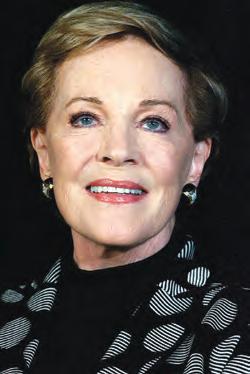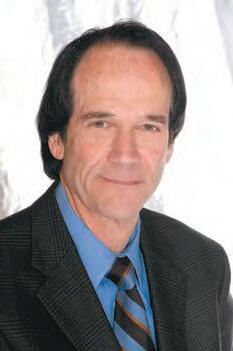6 minute read
‘Not Your Mother’s Judaism’
Next Article
OUR COMMUNITY
‘Not Your Mother’s Judaism’
Shaarey Zedek to present NYC’s Park Avenue Synagogue Rabbi (and U-M alumnus) Elliot Cosgrove on June 23.
JN STAFF
Congregation Shaarey Zedek will welcome Rabbi Elliot J. Cosgrove, Ph.D., head rabbi at Park Avenue Synagogue in New York City, to the annual Rabbi Irwin Groner Memorial lecture at 7 p.m. on June 23 at the Southfield shul.
Ordained at the Jewish Theological Seminary (JTS) in 1999, Cosgrove earned his doctorate at the University of Chicago Divinity School. He is the author of 12 collections of selected sermons, including Tree of Life (2019) and Bring Them Close (2020). He is the editor of Jewish Theology in Our Time: A New Generation Explores the Foundations and Future of Jewish Belief.
His essays and op-eds appear frequently in a variety of Jewish publications, including The Jewish Week and the Forward.
Cosgrove also sits on the Chancellor’s Cabinet of JTS and on the Editorial Board of Conservative Judaism. A member of the executive committee of the Rabbinical Assembly, he is also an officer of the New York Board of Rabbis and a member of the board of UJA-Federation of New York.
Recently, CSZ Rabbi Aaron Starr had the chance to interview Cosgrove in anticipation of his upcoming visit to Metro Detroit. Here are the highlights of that conversation.
Starr: You’ve titled your lecture “Not Your Mother’s Judaism.” What do you mean by that?
Cosgrove: I wanted to convey with the title the urgent need to ask questions on the Jewish docket for our moment, not our mother’s, not our grandmother’s, not our great-grandmother’s moment. I think the task of Jewish leadership, whether lay or professional, is to ask what the questions are the Jewish community faces today.
A great philosopher once wrote that we are all destined to live in the time into which we were born. Meaning none of us has the choice that we were born into this moment where the Israel conversation is where it is, where the intermarriage conversation is where it is, where the COVID conversation is where it is … but these are the cards we’ve been dealt. And so, we need to have an honest, open conversation about what Judaism and the Jewish people look like today.
Starr: What I’m most excited to hear is your vision and your thoughts on where we’re going as we come out of this pandemic period, which has just exacerbated, I think, everything else going on in our world. What innovations have you seen in Judaism over the last two years? And how do you think these innovations might forever change Judaism?
Cosgrove: The pandemic was something that none of us was counting on. We all had to pivot in 2020, and now we are kind of taking one step forward, two steps back, two steps forward, one step back. And we’re asking ourselves questions about what we’ve learned.
For example, we can get the same meetings done on Zoom that we used to have to travel for.
The online opportunities led Park Avenue Synagogue to have a national and, in some cases, international presence, right? I’m a shul Jew in my kishkas, yet I have had enough conversations with people for whom we’ve been a lifeline to know that the Jewish agenda has been forwarded by way of our efforts.
However, I also think we have to privilege the in-person. That’s actually the most active conversation we’re having in my synagogue. We’ve had a tremendous run with our online offerings, but we want tuchuses in the pews.
Starr: Are you optimistic or pessimistic about the Jewish future?
Cosgrove: The innovations over the last couple years have changed our synagogues, our lives, our trajectory in many ways. Undoubtedly, there are silver linings, right? I used to teach my minyan class, which consisted of 10 Jews and bad synagogue coffee. Now, there are 120 people studying every Tuesday morning. That is the spread of Torah. And that, I have to say, is a good thing.
My fear is that a robust Jewish identity happens by way of community engagement, one-to-one contact. That’s the secret sauce. Those quiet conversations you have when you’re collecting your books after an adult ed class or committee meeting. That is where the friendships are made. I think we have taken a body blow as a community
Rabbi Aaron Starr Rabbi Elliot J. Cosgrove

on those fronts.
I’m deeply concerned that the congregational school model was a broken model before COVID. I think it’s now laid bare its inadequacies. These kids haven’t been in a classroom in a regular way. I’m seeing that take shape as to where their identities, where their competencies are when they’re called up to the bimah as a bar or bat mitzvah. It’s of concern.
Starr: I’ll shift gears a little bit. You are on the board now of the University of Michigan Hillel. What is the experience like today for Jewish college kids? And how do you see that impacting the Jewish future?
Cosgrove: Not only am I a graduate of the University of Michigan, I have a daughter at U-M and another daughter on her way. So, I can look from both vantage points. I think this is the best of times and worst of times to be a college student on campus. I’m actually not concerned in a way perhaps I should be because of how strong Michigan Hillel is; but I think the Israel BDS conversation is manageable. I think it tends to get more airplay than it deserves.
I actually am more concerned about the inability of people to come together in the same way, such as it was for me, when I walked into Michigan Hillel and someone tapped me on the shoulder. That’s not happening with the same ease now.
It seems everything has to be intentional these days. You’ve got to show proof of vaccination, and you have to make a conscious decision that you’re going to mask up and sit with someone. The numbers of Friday night dinners are down. I know that for those students who are engaged, a good Hillel has been the anchor of community and identity. The work of Hillel is even more important right now.
Starr: Just one more question. If you could tell every Jew in America one thing, what would it be?
Cosgrove: Do a mitzvah. When I say mitzvah, I mean an act of positive Jewish identification. It might be lighting Shabbat candles. It might be ordering from one side of the menu, as opposed to the other side. It might be putting on tefillin in the morning. It might be any number of acts that differentiate you as a Jew. It’s Jewish mitzvahs we need to do. I think this goes to the heart of it.
We actually have a toolbox bequeathed to us through the generations by which Jews form community. And we come together at Shabbat tables and at communal celebrations at Shabbat services.
“We have the tools to do that in a distinctly Jewish way that uplifts the soul and the spirit.
This lecture is free and open to the community. Register at https://jlive.app/ events/2358.
Paid for by Janice Winfrey For Congress












